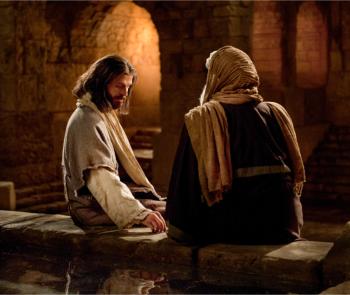The fourth Sunday in Lent is traditionally known as “Laetare” (Rejoice) Sunday. In the midst of Lent, the liturgy today reminds us of what we are about during this holy season. We rejoice because through Jesus we have received healing for our broken spirits. And we believe that if we live by the kind of love Jesus shows us from the cross, we too can be life-giving for a broken and suffering world. We are called to mirror what we see in Jesus' life, death and resurrection. And we hope that those who are just as broken can look to us to find help and healing.
 In the Gospel of John, "eternal life" isn't something that starts when we die. It begins here and now for us. It means having a meaningful life, a life rich in God's presence, a life that draws from a deep source within our very beings. The Gospel life is a life of resolve and power to forgive others, a life of seeing by a light that is not of our own achievement but one that has been given to us. Eternal life is all this and so much more and it has been given to all of us who look on the Son of Man, the one "lifted up."
In the Gospel of John, "eternal life" isn't something that starts when we die. It begins here and now for us. It means having a meaningful life, a life rich in God's presence, a life that draws from a deep source within our very beings. The Gospel life is a life of resolve and power to forgive others, a life of seeing by a light that is not of our own achievement but one that has been given to us. Eternal life is all this and so much more and it has been given to all of us who look on the Son of Man, the one "lifted up."This week's text is not the whole story of the conversation between Jesus and Nicodemus. It is actually the climax of what John wants to say and he assumes that we have been there listening to these two all along. Nicodemus is presented as a leading member of the religious hierarchy in Jerusalem who has come to Jesus in the middle of the night to seek answers to questions about Jesus' ministry that have challenged him. But it is pretty fair to say that Nicodemus was a man who wanted to keep himself in the shadows when it came to Jesus. Just out of harm's way. Safe not seen.
The story of Jesus and Nicodemus is not that of a private conversation about theology. It's about Christ's radical protest that was and is against the evil we do to one another in the name of religion. It's about the need to drag such evil out into the light and expose it for what it is. It is not enough for us to be a Nicodemus - orthodox, well-connected and able to say all the right things. We have to be prepared to lay it on the line. We have to be prepared to step into the light for the love of God who sent his Son.
For us there can be no middle ground. The Son of God’s coming into our world requires a choice. Do we believe in Him? If we do, how do our lives reflect that belief? The Gospel tells us that the coming of God’s Son into the world has brought us light. If we see by that light we are guided by it and live the truth the light shows us.
The overall message of Lent is not about condemnation, but what we hear repeated in today’s Scriptures. Paul sums it up: “God who is rich in mercy even when we were dead in our transgressions, has brought us to life with Christ.”
We have reason to Rejoice, indeed!




